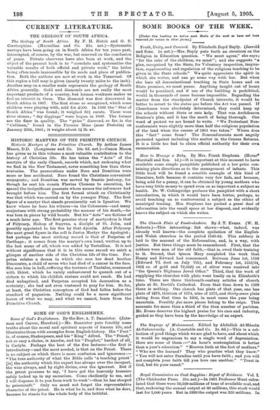HISTORIC MARI YES OF THE PRIMITIVE CHURCH.
Historic Martyrs of the Primitive Church. By Arthur James Mason, D.D. (Longmans and Co. 10s. 6d. net.)—Canon Mason has given us in this volume a most valuable contribution to the history of Christian life. He has taken the "Acts" of the martyrs of the early Church, records which, not reckoning what we find in the New Testament, cover something less than three Centuries. The persecutions under Nero and Domitian were more or less accidental. Nero found the Christians convenient scapegoats ; and Domitian was moved by frantic jealousy, for though he sent his cousin Flavins Clemens to execution, he spared the insignificant peasants whose names the informers had brought before hint. The first formal attack on Christianity Was that which was carried on by the younger Pliny. The first figure of a martyr that stands prominently out is Ignatius. We know where he bore his witness—in the Colosseum—and many conjecture with strong probability the manner of his death,—he was torn in pieces by wild beasts. But his " Acts " are fictions of a much later age. The first genuine story of martyrdom is that of PClycarp, Bishop of Smyrna, a disciple of St. John, and possibly appointed to his See by that Apostle. After Polycarp the next great figure in the roll is Justin Martyr the Apologist; but perhaps the most striking record is that of Perpetua of Carthage ; it comes from the martyr's own hand, written up to the last scene of all, which was added by Tertullian. It is not without significance that it is in this same record we catch a glimpse of another side of the Christian life of the time. Per- petua relates a dream in which she sees her dead brother Dinocrates, a child of seven who had died of a cancer in the face. She sees him in hell, suffering the tortures of Tantalus, consumed with thirst, which he vainly endeavoured to quench out of a cistern to which his childish stature could not reach. He had died unbaptised, and Perpetua accepted his damnation as a certainty; she had not even ventured to pray for him. So far, at least, the Christian conception of God had fallen below the standard of paganism. Nothing could be a more significant lesson of what we may, and what we cannot, learn from the Primitive Church.






































 Previous page
Previous page